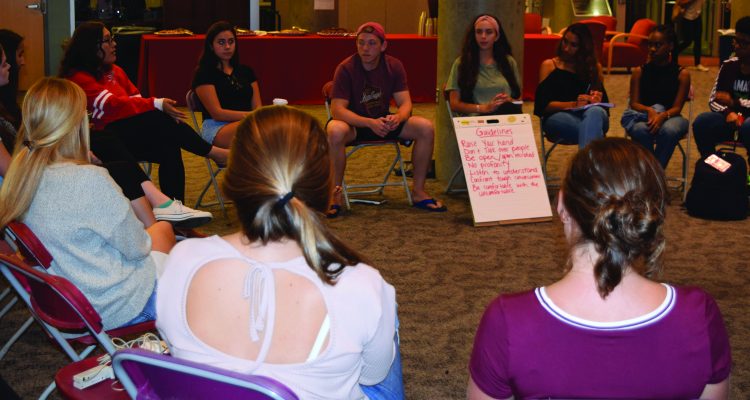On Monday, Sept. 18, Fairfield University Student Association and the CARE Team partnered up to have an open dialogue titled “How to Have a Healthy Conversation.” The CARE Team, a new organization on campus, facilitates dialogues across campus, so this was an important conversation for them to have. They cover a wide range of controversial topics at their dialogues, so learning how to discuss with other people, especially those with differing opinions, in a respectful and healthy way is crucial to their program.
Since the dialogue was meant to be confidential and a safe place for students to openly talk and express themselves, no student names will be included in this article.
Before the dialogue began, the CARE Team asked the students present to create a list of guidelines for the conversation. These became rules for everyone to follow to maintain a healthy dynamic. The guidelines set were: raise your hand when you would like to speak, don’t talk over others, be open-minded, no profanity, listen to understand, confront tough conversations and be comfortable with the uncomfortable.
Junior Alexandra Cordero, a member of FUSA, added, “Argue the point, not the person. Everything you say goes out the window when you personally attack someone.” The Care Team added to this, saying “Shed your stereotypes from the get-go.”
When discussing the guidelines, one student said, “Talk about things that matter, things that people think shouldn’t be talked about.” Many students present made the point that people don’t like to talk about uncomfortable things or things that they aren’t completely educated on or cannot relate to, but Cara Gibbons ‘18, president of FUSA, challenged them. She said, “This is college. This is your time to be comfortable with the uncomfortable and talk about these things.”
One controversial topic that came up was the difference between hate speech and freedom of speech, or if there is a difference at all. In other words, as one member of the CARE Team Justin Wooley ‘20 phrased it, “Who is the gatekeeper between free speech and hate speech? How can we have a healthy dialogue in a place where there may be dangerous rhetoric being thrown around?”
Some students argued that hate speech should not be considered freedom of speech. One student said, “No one should be protected if they’re verbally harming someone,” and another had a similar view, saying “when hate speech leads to violence, I have a problem with it.”
Other students argued the opposite, claiming that hate speech does fall under the First Amendment. One student said, “People should be able to say what they want, it’s only when they threaten violence that it should be a problem.” Another student agreed with this view, arguing that “hate speech is free speech because our government protects it.”
This controversy over hate speech led to a brief conversation about the events that recently happened in Charlottesville, Va., where rallies of white supremacists and Nazis formed, chanting things like, “Jews will not replace us” and racial slurs. These people, as a FUSA member explained, had a permit to protest and were therefore protected from being reprimanded. It is problematic to many people that such hateful and violent protest is allowed in our country, which is why this topic was brought up in the debate over hate speech.
At the end of the dialogue, everyone went around and gave their opinion on why conversations like this are important to have. Many students talked about their experiences in high school, where their opinions were not valued and they were simply lectured all day, everyday. One student said, “The CARE Team programs open my eyes to other people’s points of views,” and another claimed, “the only way to grow as a society is to share ideas.”
Cordero explained, “This is one of the many dialogues we want to have this semester, and we really want to encourage people, regardless of what year they are, to leave Fairfield understanding how to engage in these types of conversations when they graduate.”
Gibbons believed that the conversation was successful. “We’ll hopefully get a larger turnout next time, but I think it started to open up the conversation.”
FUSA Vice President Molly Strang ‘18 agreed, saying, “I think that having these open dialogues and conversations before issues occur is very beneficial, so that when something does happen and we need to address it, we know how to do so and don’t wait until the last minute.”
The CARE Team has facilitated conversations on Mondays in McCormick at 8:30 p.m., Tuesdays in Faber at 8 p.m. and Wednesdays in Loyola Hall at 8 p.m. For students who don’t feel comfortable talking at events like this, they welcomed students to “just come and listen and hang out,” and that the real value of these dialogues comes from “opening your mind to different views.”


Leave a Reply